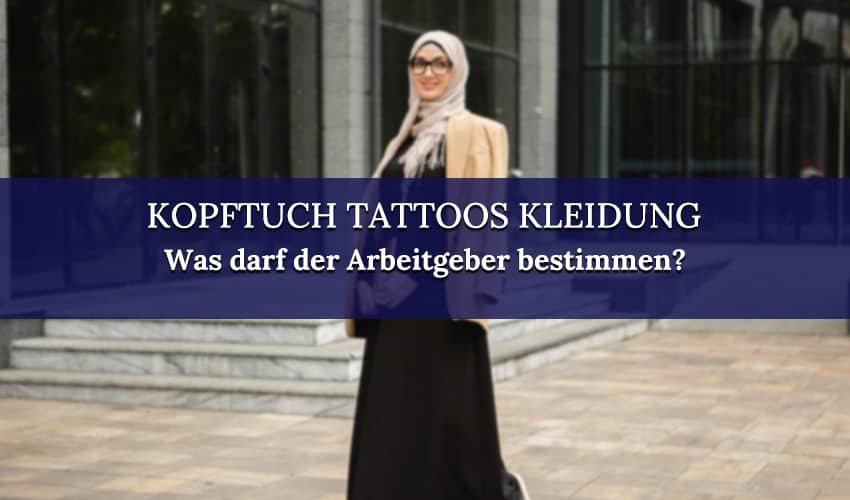
Headscarves and tattoos: what employers can - and cannot - prohibit
The alarm clock rings, quickly to the bathroom, grab the baggy look from the wardrobe and fire up the laptop: during the coronavirus pandemic, many employees have become accustomed to jogging bottoms as legitimate workwear. In the home office, the boss doesn't care whether you wear a tie or underpants: The main thing is that the work is done on time and the employee is reliably available.
But now that many employees are returning to the office, a problem that has been suppressed for the last few months is once again appearing before the German labor and administrative courts: To what extent is the employer allowed to influence the external appearance of the employee?
This often involves tattoos, body jewelry or religious symbols such as the headscarf. There is no clear legal situation in this area, which is why employers and employees often find themselves in court.
In this article, you will learn about the general legal framework, the differences between the civil service and the private sector and how you can best enforce your rights as an employer and employee!
The civil service: neutrality first and foremost
An important distinction must be made at the outset between the different types of employers that exist in Germany. Let us first look at the civil service. Here, sovereign activities are carried out and a classic relationship of superiority and subordination prevails.
The German state sees itself as ideologically and religiously neutral, so in theory all worldviews must be treated equally. A preference for a certain way of life or a certain faith must not be permitted. The decisive factor here is above all constitutional law, which determines the prevailing constellation.
Body art: When tattoos become a problem
The social perception of tattoos and their effect has changed in recent years. Until recently, body painting was an absolute no-go in job interviews, especially in the civil service, but it is now accepted body jewelry in large parts of society. Despite this, applicants are still rejected, especially in the police service, if they have conspicuous tattoos.
A case from practice: The Düsseldorf Administrative Court had to deal with the rejection of a police candidate who wore a large skull tattoo. The state of North Rhine-Westphalia rejected the applicant as it saw the body decoration described as a statement glorifying violence that was incompatible with the sovereign duties of a civil servant. However, the administrative court ruled in favor of the police candidate. The latter referred to other tattoos, such as a dove, with which the skull and crossbones formed an overall picture. After an examination, the Administrative Court came to the conclusion that the tattoo as a whole did not glorify violence.
Not compatible with sovereign tasks?
Nevertheless, the case before the Administrative Court in Düsseldorf provides a rough overview when it comes to tattoos in a state employment relationship. An important justification for rejecting an applicant is given if the body decoration is not compatible with the sovereign duties of a state employee and is in line with the values of the job performed. The labor courts must examine the individual cases and then decide whether this is indeed the case - or whether the state as an employer has acted prematurely and wrongly.
Cross and headscarf: Religious symbols put to the test
Religious symbols in particular are a recurring issue for the courts in Germany. Here, too, the difference between the civil service and the private sector must be pointed out: The civil service is concerned with sovereign tasks, a relationship of superiority and subordination and representation of the state. In the private sector, on the other hand, it is primarily about the customer relationship, where the employer has to decide which clothing and which symbols are still appealing and which are not.
A typical case that is repeatedly brought before the courts in Germany is that of the headscarf in the performance of state duties, especially for female teachers. The decisive factor for the court ruling is what type of function the civil servant has: Is he or she in a relationship of superiority and subordination and in what way does he or she act as a representative of the state?
In general, religious neutrality must always be paramount. However, the constitutional guarantee of religious freedom can also be referred to when weighing up the activity in the public service, which employees often do in court. For example, wearing a headscarf may be permitted for one civil servant but not for another!
Visibility remains an important criterion for the courts when deciding on religious symbols of any kind. A small religious symbol worn around the neck is assessed differently from a headscarf, which is clearly more visible.
Private sector: Does the boss decide what I wear?
The situation in the private sector is similar to that in the civil service. Here, however, the constellation is not determined by a prevailing relationship of superiority and subordination, but by the customer relationship. For example, if a certain dress code is to be observed that suits the company in question. Different standards certainly apply in a casino than in a cleaning job.
In principle, the following applies: If a certain dress code is stipulated in the company, it must be accepted and adhered to by the employees. This is dictated by entrepreneurial freedom and the stipulation of certain clothing in the signed employment contract. Violations can result in sanctions under labor law and a leave of absence!
Corresponding rulings from the European Court of Justice in summer 2021 confirm this prevailing legal line. Companies must prove consistency and an economic need, often summarized under the keyword of neutrality. Ideally, all highly visible religious symbols are therefore banned in the company, regardless of whether they are Christian, Muslim or Jewish.
Complaining employees: Wait and see?
If employees take legal action against a certain dress code, this often results in a difficult situation for the employer. The legal proceedings can often drag on for years, and the legal risk remains constant. It is therefore advisable for companies not to rely solely on the courts and instead continue to employ the employee in a different role. It makes sense to offer the employee another job or to consider dismissal with notice. In this way, the financial loss remains within reasonable limits and the employee's working capacity can continue to be used.
Don't wait and see, but create alternatives!
Conclusion: It depends on the individual case and proportionality!
In summary, it should be noted that the competent courts must always look at the specific individual case and decide on the basis of this whether an employee's complaint is justified. There is no consistent legal line on tattoos, headscarves and the dress code in the workplace. It is therefore advisable for every company to strive for the greatest possible neutrality. In this way, you protect yourself and create a good basis for possible legal disputes.
As an employer, a certain tolerance towards the employer's decisions is an advantage. Court rulings show that the state and private companies are entitled to certain rights. It is advisable to take legal action if you actually lose your job or are unable to take up a position. If you feel that you have been unjustly rejected, sue for your rights. The case from Düsseldorf has shown that courts are now much more modern in their reasoning. We stand by your side!







